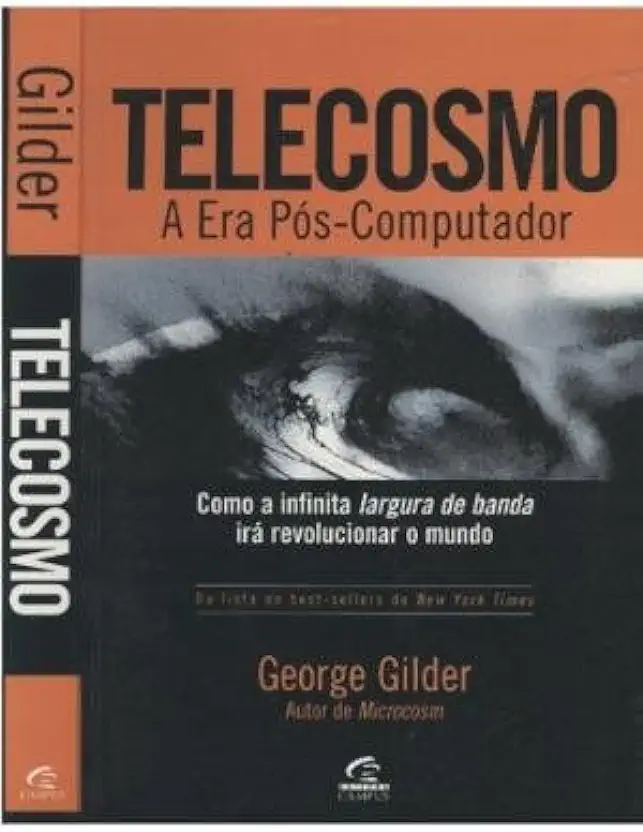
Telecosm: The Post-Computer Era - George Gilder
Telecosm: The Post-Computer Era
In his groundbreaking book, Telecosm, George Gilder argues that the computer revolution is over and that a new era of telecommunications is dawning. He predicts that the next great wave of innovation will come from the convergence of telecommunications and computing, and that this convergence will lead to a new era of economic growth and prosperity.
Gilder begins by arguing that the computer revolution has reached its limits. He points out that the growth of computer processing power has slowed down, and that the cost of computing has not declined as rapidly as it once did. He also argues that the computer has become a commodity, and that there is little room for innovation in the hardware sector.
In contrast, Gilder argues that the telecommunications industry is still in its early stages of development. He points out that the cost of telecommunications has been declining rapidly, and that the number of people who have access to telecommunications is growing rapidly. He also argues that the telecommunications industry is more innovative than the computer industry, and that there is a great deal of room for growth in this sector.
Gilder predicts that the convergence of telecommunications and computing will lead to a new era of economic growth and prosperity. He argues that this convergence will create new opportunities for businesses and individuals, and that it will lead to a more efficient and productive economy. He also argues that the convergence of telecommunications and computing will make the world a more connected and globalized place, and that it will lead to greater understanding and cooperation between people of different cultures.
The End of the Computer Revolution
Gilder argues that the computer revolution is over for three main reasons. First, he points out that the growth of computer processing power has slowed down. He notes that the speed of computer processors has increased by only about 50% in the past decade, compared to an increase of over 100% in the previous decade.
Second, Gilder argues that the cost of computing has not declined as rapidly as it once did. He notes that the price of a personal computer has declined by only about 50% in the past decade, compared to a decline of over 90% in the previous decade.
Third, Gilder argues that the computer has become a commodity. He points out that there is little room for innovation in the hardware sector, and that most computers are now made in China.
The Rise of Telecommunications
Gilder argues that the telecommunications industry is still in its early stages of development. He points out that the cost of telecommunications has been declining rapidly, and that the number of people who have access to telecommunications is growing rapidly. He also argues that the telecommunications industry is more innovative than the computer industry, and that there is a great deal of room for growth in this sector.
Gilder cites several examples of the rapid growth of telecommunications. He notes that the number of mobile phone subscribers has grown from 1 billion in 2000 to over 7 billion in 2015. He also notes that the amount of data traffic on the Internet has grown by over 100% per year for the past decade.
Gilder argues that the telecommunications industry is more innovative than the computer industry. He points out that the telecommunications industry has been responsible for a number of major innovations, such as the Internet, mobile phones, and satellite communications. He also argues that the telecommunications industry is constantly evolving, and that there is a great deal of room for growth in this sector.
The Convergence of Telecommunications and Computing
Gilder predicts that the convergence of telecommunications and computing will lead to a new era of economic growth and prosperity. He argues that this convergence will create new opportunities for businesses and individuals, and that it will lead to a more efficient and productive economy. He also argues that the convergence of telecommunications and computing will make the world a more connected and globalized place, and that it will lead to greater understanding and cooperation between people of different cultures.
Gilder cites several examples of how the convergence of telecommunications and computing is already having a positive impact on the world. He notes that the Internet has made it possible for people to communicate with each other instantaneously, regardless of their location. He also notes that the Internet has made it possible for people to access information and entertainment from all over the world.
Gilder argues that the convergence of telecommunications and computing is still in its early stages, and that the full potential of this convergence has yet to be realized. He predicts that the next great wave of innovation will come from the convergence of telecommunications and computing, and that this convergence will lead to a new era of economic growth and prosperity.
Conclusion
Telecosm is a must-read for anyone who wants to understand the future of technology. Gilder's insights are provocative and thought-provoking, and his predictions are sure to spark debate. Whether you agree with him or not, Gilder's book is sure to challenge your thinking about the future of technology and its impact on our lives.
Enjoyed the summary? Discover all the details and take your reading to the next level — [click here to view the book on Amazon!]